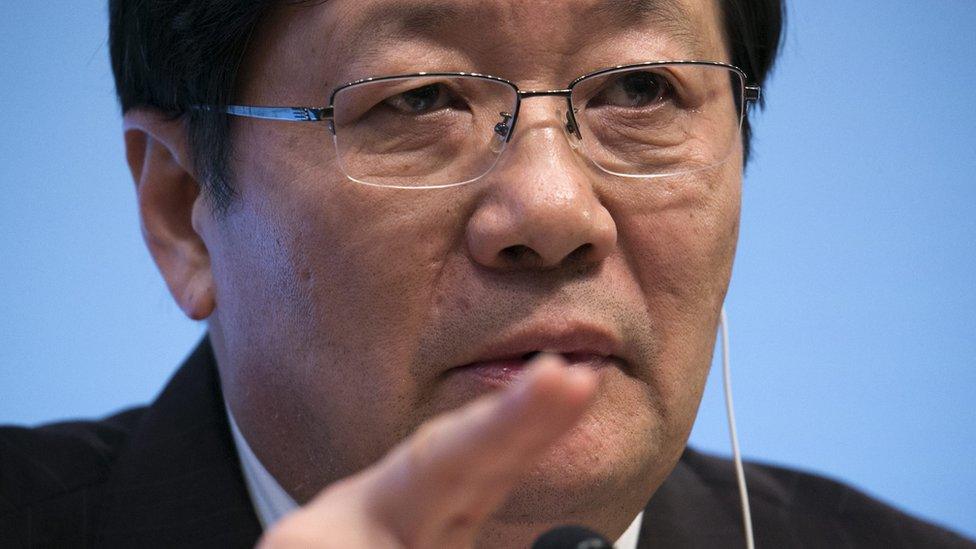Why did China axe Finance Minister Lou Jiwei?
- Published

When the world's second largest economy has a change of guard in one of its most important ministerial posts, people notice.
So China's globally renowned finance minister Lou Jiwei being replaced by the relatively unknown Xiao Jie, has caused quite a stir.
Mr Lou was seen as one of the government's more outspoken and reformist figures. His replacement, Mr Xiao, is a long time bureaucrat from China's Ministry of Finance.
The move comes as global concerns grow about China's economic slowdown.
Beijing is trying to rebalance the economy, and drive growth through domestic consumption - with less reliance on the old pillars of the economy: manufacturing, exports and debt.
But so far, , it doesn't seem to be working all that well. China's economy grew at an annual rate of 6.7% in each of the first three quarters of 2016 - the slowest rate in a quarter of a century. In fact China has increasingly had to depend on some of those old pillars to keep growth going.
So why was Mr Lou replaced during these precarious times? And what - if anything - does this move mean for the fortunes of China's economy?
In the first instance, the move itself "introduces a level of uncertainty, which is never a good thing with respect to one of the most opaque economies in the world", says Vinesh Motwani of Silk Road Research.
Mr Lou is a familiar face in the international investment community and was well-respected, so his departure will be viewed as a loss, he adds.
Who is Xiao Jie?
But Xiao Jie is no rookie in this field either. Serving in China's finance and tax system for 29 years, he has stood out as a long-term advocate for tax reform.
Xiao Jie is relatively unknown outside of finance circles
And according to Brian Jackson of IHS Global Insights, his taxation experience will be an asset when formulating and implementing a national property tax - something China wants by 2018.
Mr Jackson adds that Mr Xiao's background suggests he should be able to continue pushing through fiscal policies of the last several years, and use his experience to implement new tax policies that will help put "China on a more sustainable fiscal revenue path".
But the most colourful insight into the man catapulted into the high profile job comes from one of Beijing's local news agencies.
Buried among the references to being "very hard-working", and having "lots of self-discipline", a story about Mr Xiao's virtues has been making the rounds.
Apparently he only smokes cheap cigarettes - the local brand Zhong Nan Hai - so that he can reject anyone trying to bribe him with a more expensive variety.
It's a tale that should go down well amid the current anti-corruption drive that President Xi Jinping has been leading,
Xi vs Li?
So should this move be seen as a way to push out the vocal government critic, in favour of a more malleable and accommodating comrade? Or the physical manifestation of the power struggle between President Xi Jinping and Premier Li Keqiang?
It's impossible to say for sure. China's political decisions are rarely transparent and whether this was a move by President Xi Jinping to move someone into a position of power who shares his view of the economy, we'll probably never know.
And there's an argument that as Mr Lou turns 66 next month, enforced retirement beckoned anyway.
But what many China observers are saying is that President Xi is consolidating his power ahead of next year's party congress - and while he does that, his focus on reforming the economy may not be topmost on his mind.
- Published27 September 2016